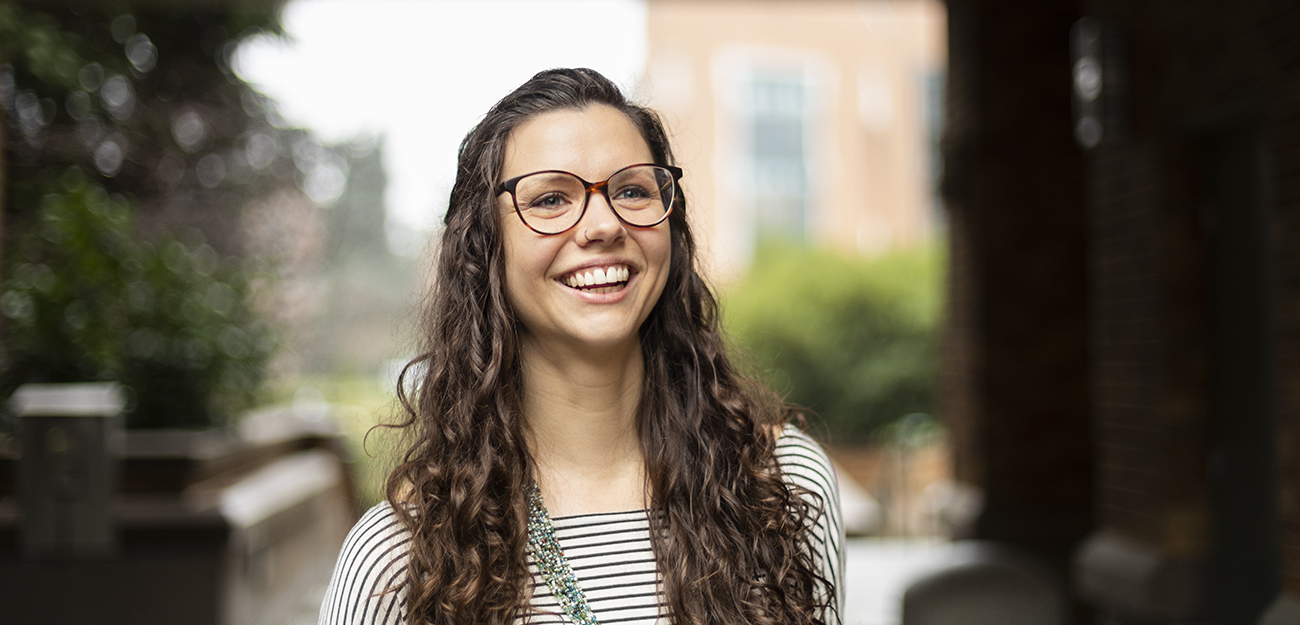
Emily Rabe loves puzzles. In high school, she and her best friend happily spent their Friday nights with jigsaw puzzles and a half-gallon of ice cream. Rabe’s father built her a custom puzzle board to take to college in Minnesota, which she later brought to Seattle as a UW graduate student. Now Rabe is immersed in a puzzle of a different sort through her chemistry research.
“Instead of a thousand tangible puzzle pieces, I have hundreds of data files, dozens of journal articles, and a few scattered textbooks,” says Rabe, a fifth-year doctoral student in the Department of Chemistry. “But still, I start by making small connections, and piece by piece I get to build up the picture.”
Rabe works in the lab of Cody Schlenker, assistant professor of chemistry, researching the potential of sunlight as an energy source--specifically how light interacts with molecules interacting with other molecules. Rabe chose Schlenker’s lab based on her interest in clean energy, but also because of the camaraderie she encountered there.
“People in the lab were just so excited to be doing science, it almost didn’t seem like work,” Rabe recalls. “They just loved playing with optics and lasers. It was a really great atmosphere.”

Like her colleagues, Rabe is passionate about her research, which seeks to harness solar energy without using expensive or toxic materials. One focus of her work is the use of hydrogen molecules for fuel. The idea is not new — there are hydrogen cars on the road — but currently 98 percent of the hydrogen used for fuel is produced using methane or natural gas, releasing carbon dioxide (CO2) in the process. Rabe and other researchers are exploring a cleaner approach to producing hydrogen, using energy from sunlight to generate hydrogen molecules from water.
Though Rabe conducts most of her research in the Schlenker lab, she also has access to the resources of the UW's Clean Energy Institute (CEI) as a CEI Graduate Fellow. She finds interactions with CEI researchers from across campus particularly valuable. “As part of the fellowship program, we go to seminars that are not always on chemistry or solar energy,” says Rabe. “They might be about how we manage the grid, or how to make batteries that last longer. I think that kind of breadth has really helped frame and motivate my research. It lets me see what’s actually useful in the bigger picture.”
The fact that the department...offered me this fellowship helped me feel like I did belong here. It helped fight imposter syndrome.
Before being named a CEI Graduate Fellow, Rabe received the Paul H. and Karen S. Gudiksen Endowed Fellowship in Chemistry, awarded to a promising applicant to encourage them to study at the UW. For Rabe, the award’s significance was not just the financial support. As a graduate of a small liberal arts college, she had less research experience than many other applicants and wondered if she belonged at the UW. “The fact that the department not only accepted me but offered me this fellowship helped me feel like I did belong here,” she says. “It helped fight imposter syndrome.”
When Rabe arrived at graduate school, she already knew what to expect thanks to Nick Montoni, whom she befriended during a Chemistry Department recruitment weekend. Montoni started his graduate studies a year before Rabe, who deferred her enrollment to work at Argonne National Laboratory that year. But they stayed in touch, with Rabe seeking Montoni’s advice about when to start looking for housing in Seattle, how to navigate the city without a car, how to make the most of Chemistry Department research opportunities, and more. “It was like I had a secret ‘in,’” Rabe recalls. “I had someone I could ask all my millions of questions to before I got to campus. I had no idea how valuable that was until I arrived and realized that a lot of my cohort wasn’t so lucky.”

Rabe and Montoni decided to change that. They created the Mentorship Network, which matches incoming chemistry graduate students with current graduate students so that the new students can ask questions long before they arrive. (Montoni has since earned his PhD.) Rabe also serves as co-president of Inclusion in Chemical Sciences at UW (InCS), a graduate student group that offers camaraderie and skill building through workshops, guest speakers, science outreach to K-12 schools, and other activities.
The Department of Chemistry funds InCS, which in turn funds the Mentorship Network. Rabe believes that the Department’s support of such programs has had a meaningful impact on her graduate student experience.
“In our department, we really have a strong sense of community,” she says. “Graduate school is going to be hard no matter where you go, but here it feels like there’s a group of people who will celebrate with you when things go well, and grab a consolation beer when they don’t.”
They might even help with a jigsaw puzzle.
More Stories

AI in the Classroom? For Faculty, It's Complicated
Three College of Arts & Sciences professors discuss the impact of AI on their teaching and on student learning. The consensus? It’s complicated.

Bringing Music to Life Through Audio Engineering
UW School of Music alum Andrea Roberts, an audio engineer, has worked with recording artists in a wide range of genres — including Beyoncé.

A Love of Classics and Ballroom
Michael Seguin studied Classics at the UW and now owns Baltimore's Mobtown Ballroom. The two interests, he says, are more connected than they might seem.